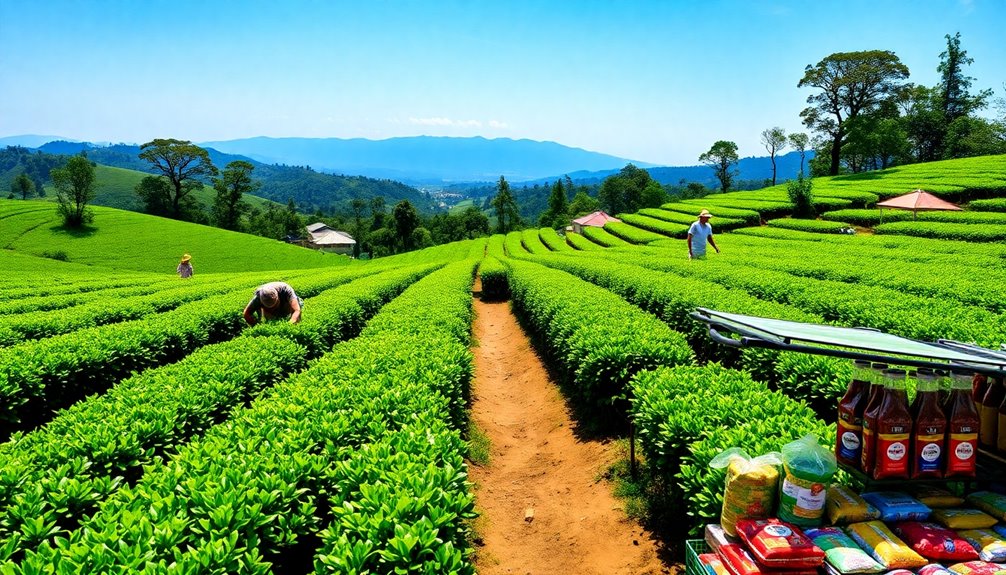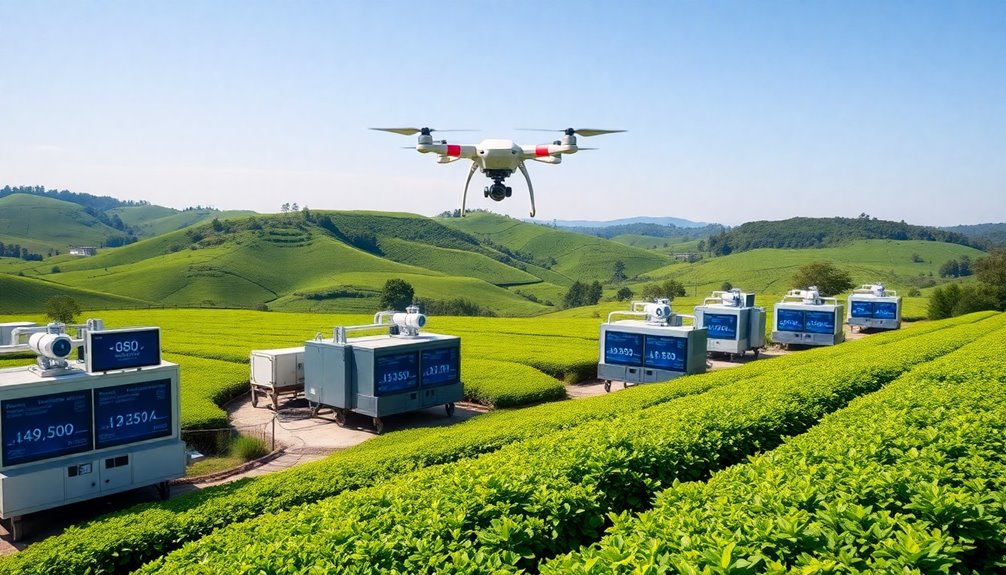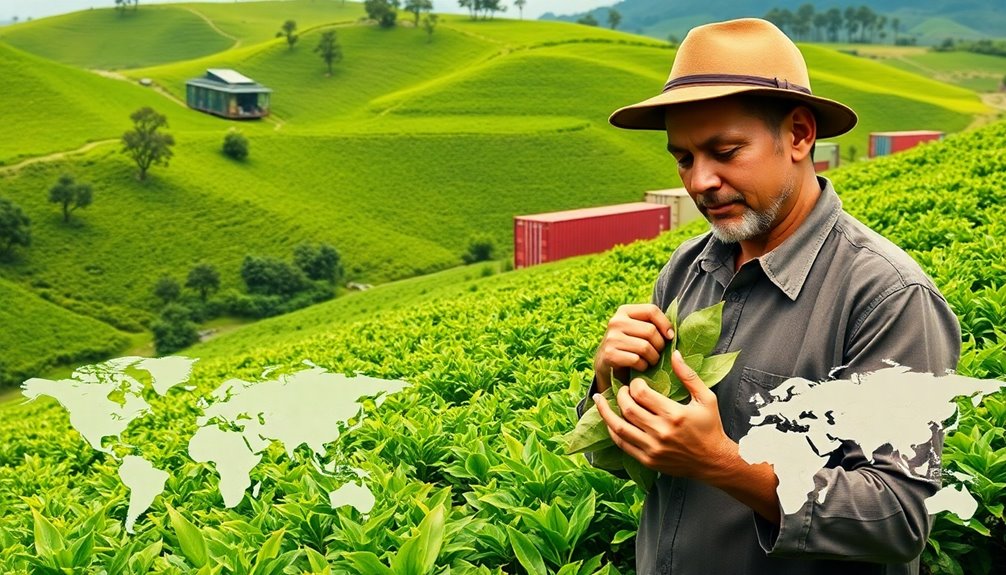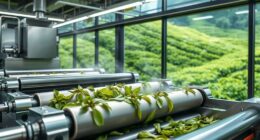Tea isn't just a tasty drink; it's super important for many developing countries! It helps millions of families earn money, especially smallholder farmers who grow about 60% of the world's tea. This cash crop helps with food, education, and better living conditions. Plus, it opens up jobs in processing and sales, benefiting whole communities. Women make up a large part of the tea workforce, gaining skills and leading the way to better lives. However, there are still challenges like low wages. Isn't it exciting to see how tea shapes lives and economies? Keep exploring to discover more amazing facts!
Key Takeaways
- The global tea trade, valued at approximately $9.5 billion, significantly contributes to the economies of developing countries.
- Tea production provides essential income for rural families, enhancing food security and overall quality of life.
- Smallholder farmers, responsible for 60% of the world's tea supply, play a crucial role in local economic stability and poverty reduction.
- Women make up about 70% of the tea workforce, leading to economic empowerment and improved family livelihoods through reinvestment in education and health.
- Improved labor rights and conditions for tea workers are vital for ensuring sustainable economic growth within the tea industry.
Introduction
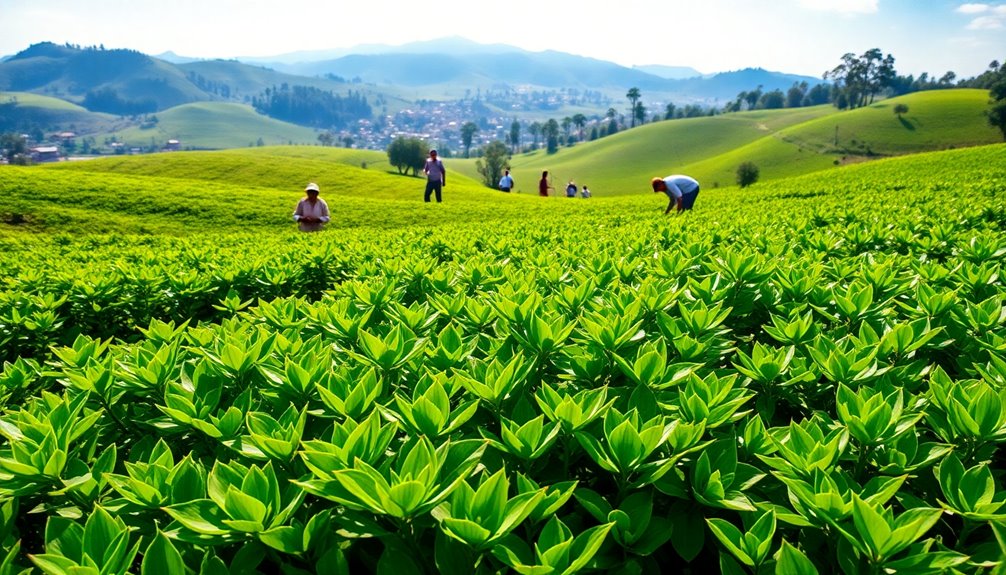
Tea is more than just a popular beverage; it's a lifeline for millions around the world. In developing countries like India, Sri Lanka, and Kenya, tea isn't just enjoyed in cups; it's a vital cash crop that supports livelihoods. Smallholder farmers play a huge role, producing 60% of the global tea supply. That's a big deal! These farmers help create economic opportunities, providing jobs and income for many families.
The global tea trade is valued at about $9.5 billion, making it an important part of national economies in low-income areas. This money helps with poverty reduction and food security, ensuring that many people can put food on their tables. When families grow tea, they're not just harvesting leaves; they're building futures.
Tea cultivation also supports sustainable development goals. It encourages gender equality by offering women chances to work in tea production, making communities stronger and more balanced.
Tea's Role in Rural Livelihoods
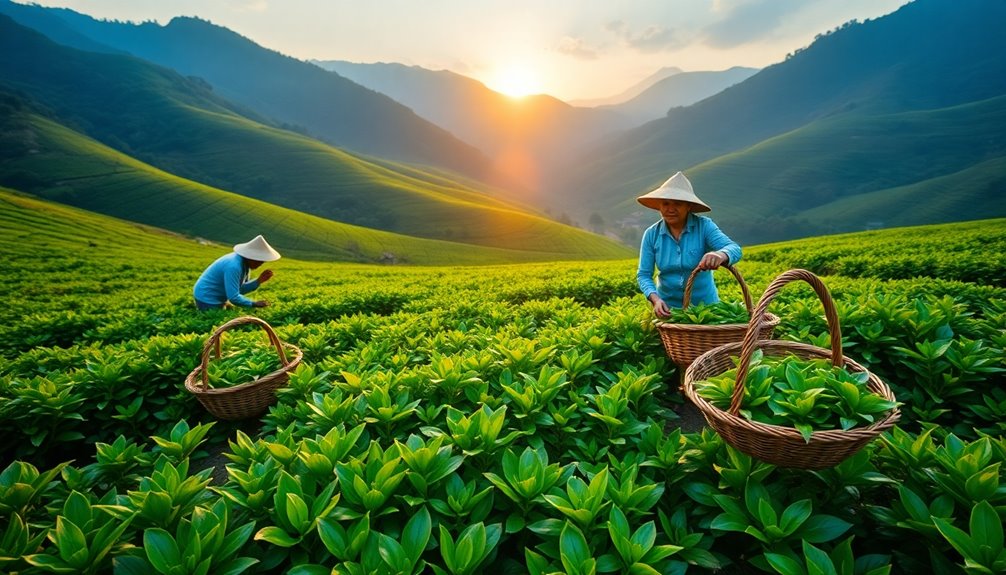
How does tea cultivation impact rural livelihoods? Tea production plays a vital role in the lives of millions, especially smallholder farmers in developing countries like India, Sri Lanka, and Kenya. You'll find that around 60% of the world's tea comes from these farmers, showing how important they're in the tea industry and their local economies.
The economic significance of tea extends beyond just growing it. The tea industry creates jobs in processing and sales, helping to boost economic stability in rural areas. By providing income opportunities, tea cultivation is essential for poverty reduction and enhancing food security.
When families earn money from tea, they can buy food, send their kids to school, and improve their overall quality of life.
Moreover, tea production fosters community development. It brings people together, creating a sense of belonging and shared purpose. As communities thrive, families feel empowered and hopeful about their future.
Tea Supports Smallholder Farmers
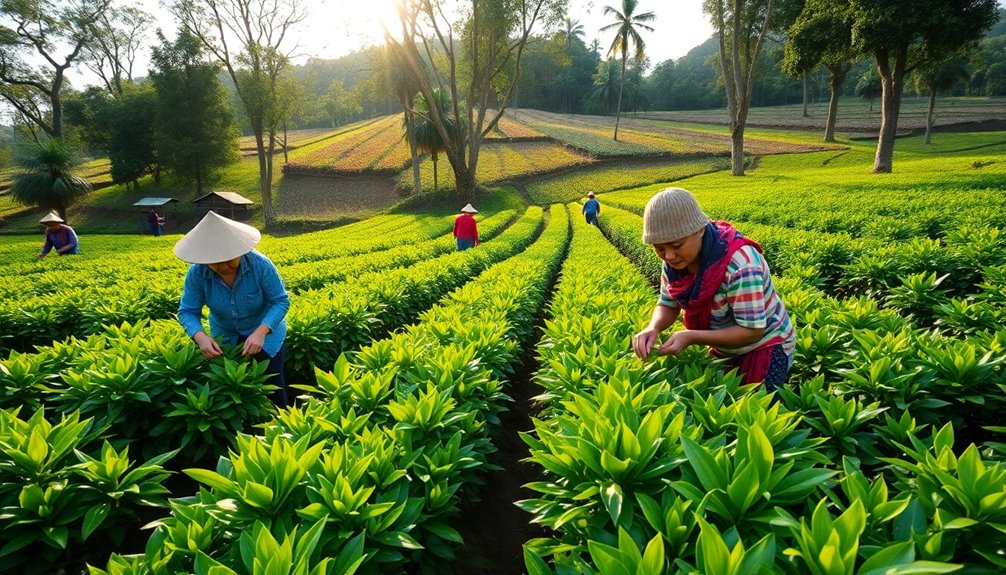
A significant portion of global tea production comes from smallholder farmers, who play a critical role in the industry and local economies. In developing countries like India, Sri Lanka, and Kenya, millions of smallholder farmers depend on tea cultivation for their livelihoods. This isn't just about tea; it's about hope and opportunity.
Tea production acts as a vital cash crop, helping to lift families out of poverty and ensuring food security in rural areas. When you support smallholder farmers, you're also supporting sustainable practices that protect the environment. Fair pricing mechanisms are key, as they allow these farmers to earn a decent income for their hard work.
The global tea trade, valued at around $9.5 billion, creates many income opportunities. By buying tea from smallholders, you help strengthen rural economies and improve their quality of life. Additionally, many smallholder farmers implement sustainable practices to ensure the long-term health of their tea crops and the surrounding ecosystem.
It's exciting to know that your choice can make a real difference! When you enjoy a cup of tea, remember that you're not just sipping a delightful beverage; you're also supporting hardworking farmers and their families.
Together, we can foster a brighter future for smallholder farmers and the communities they cherish.
Tea's Impact on Gender Equality
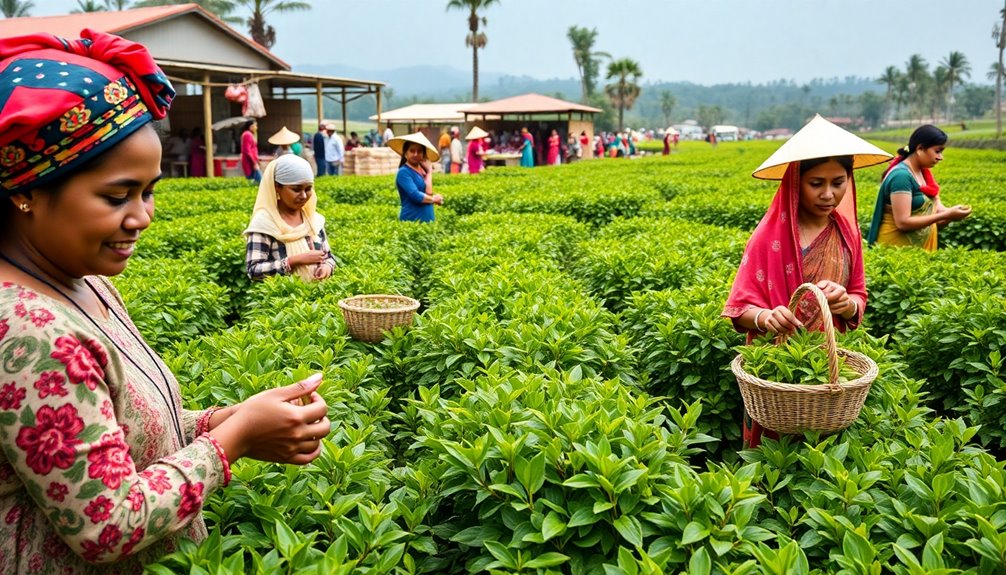
In the tea industry, women are vital players, making up about 70% of the labor force on plantations. These amazing women are involved in tea cultivation, processing, and distribution, especially in countries like India, Sri Lanka, and Kenya. Their hard work is essential for the tea sector and local economies.
When women are given access to resources and training, it leads to economic empowerment and promotes gender equality. Women's participation in sustainable tea production helps them take on leadership roles, which is so important for rural development.
Supporting women in the tea industry doesn't just benefit them; it also improves the livelihoods of their families. When women earn more, they invest in their children's education and health, creating a brighter future for everyone.
International Tea Day celebrates the incredible contributions of women in the tea industry. By recognizing their efforts, we can continue to advocate for gender equality in agricultural practices.
Labor Rights in Tea Production
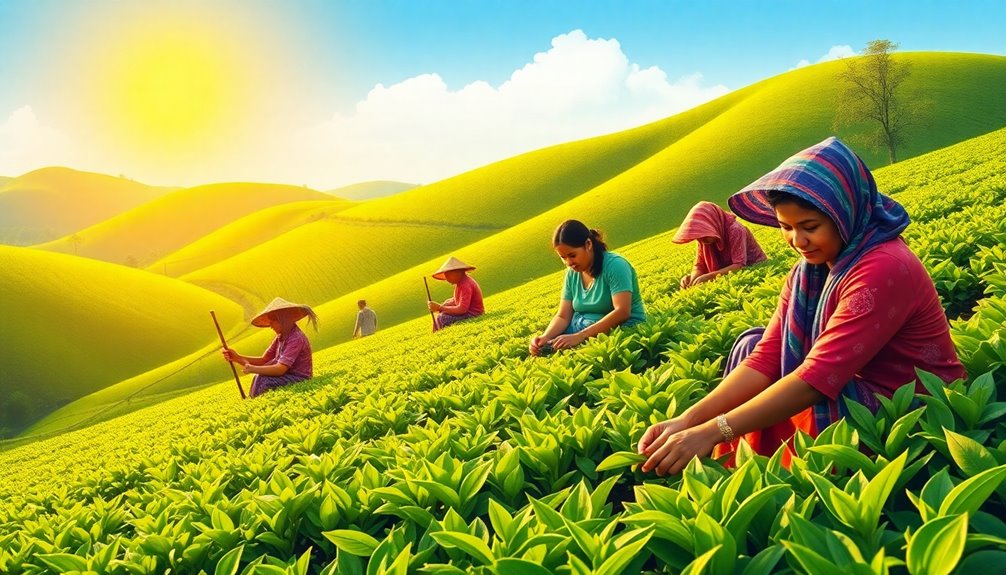
Labor rights in tea production are crucial for the millions of workers who depend on this industry for their livelihoods. In countries like India, Sri Lanka, and Kenya, people face tough working conditions. Did you know that about 70% of the tea workforce is made up of women? This highlights the need for gender equality and fair treatment in a field where women play such an important role.
Many tea workers earn low wages, work long hours, and don't always have safe places to work. These conditions can violate their basic labor rights. That's where Voluntary Sustainability Standards (VSS) come in! These standards aim to improve labor conditions in tea production, but not every farm follows them consistently.
Advocacy for better labor rights is essential. It helps boost economic stability for smallholder farmers and ensures social equity for all workers involved in the tea supply chain.
Practical Applications
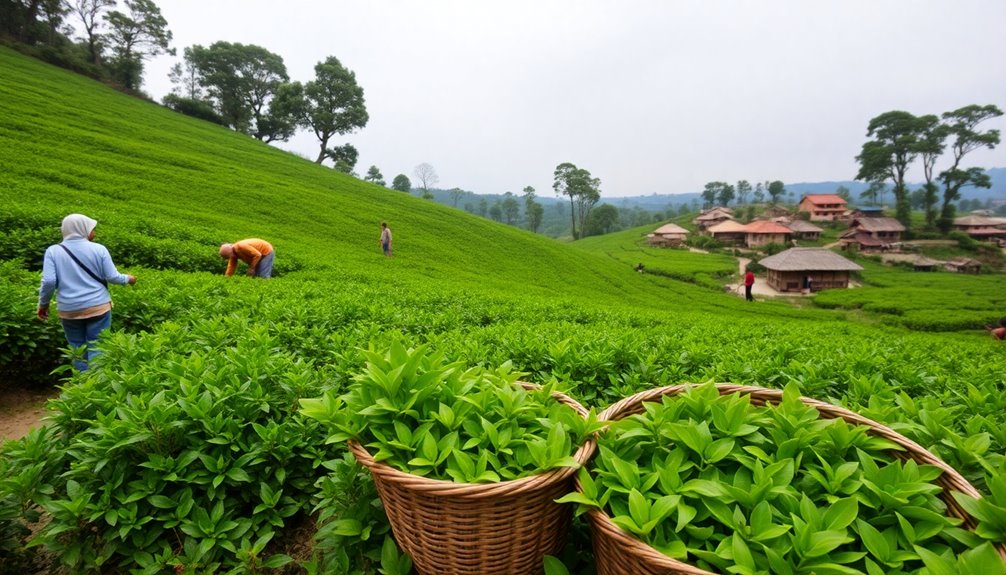
Harnessing the economic potential of tea production brings tangible benefits to communities and countries alike. When you think about tea, remember that it's more than just a drink. For farmers in developing countries, tea is a vital source of income and a path to rural development. Millions depend on this cash crop, especially in places like India, Sri Lanka, and Kenya.
Tea production helps combat poverty reduction by creating jobs and supporting families. Many smallholder farmers, who make up 60% of global tea production, use their earnings to invest in food security. This means they can grow more food and improve their living conditions.
Moreover, tea cultivation promotes gender equality. Women play a huge role in tea processing and farming, giving them new opportunities and boosting their social status within their communities.
Frequently Asked Questions
What Is the Economic Importance of Tea?
Tea's economic importance lies in its ability to generate income, create jobs, and support local economies. You'll find it fuels trade, fosters entrepreneurship, and enhances livelihoods, making it essential for community growth and sustainability.
What Is the Economic Importance of Tea in Kenya?
Tea's economic importance in Kenya can't be overstated. You see, it generates substantial export earnings, supports countless smallholder farmers, and creates jobs, significantly impacting rural livelihoods and contributing to the country's overall economic growth.
Why Is Tea Important to the World?
Tea's important to you because it's a daily ritual, a symbol of connection, and a cultural staple. Its global reach fosters community, supports economies, and promotes health, making it a cherished beverage worldwide.
Why Is Tea Valuable to the Food Industry?
Tea's valuable to the food industry because it adds unique flavors and health benefits to dishes. You can enhance culinary creations with its versatility, making it a popular choice in restaurants and home kitchens alike.
Conclusion
In conclusion, tea is more than just a tasty drink! It plays a big role in helping communities thrive in developing countries. By supporting small farmers, boosting gender equality, and improving workers' rights, tea brings joy and hope. Every cup you sip supports a brighter future for many families. So next time you enjoy your favorite tea, remember how it helps people around the world! Let's celebrate the amazing impact of tea together!

